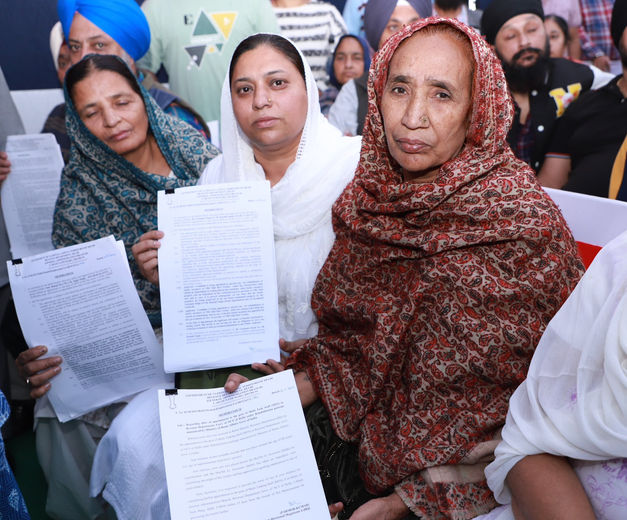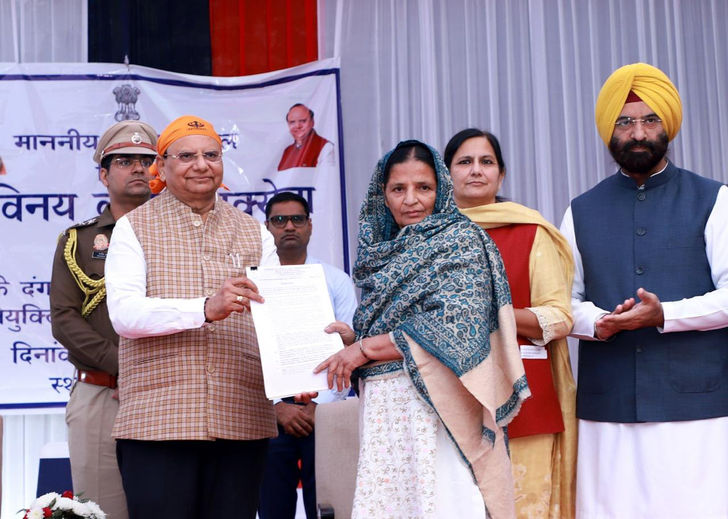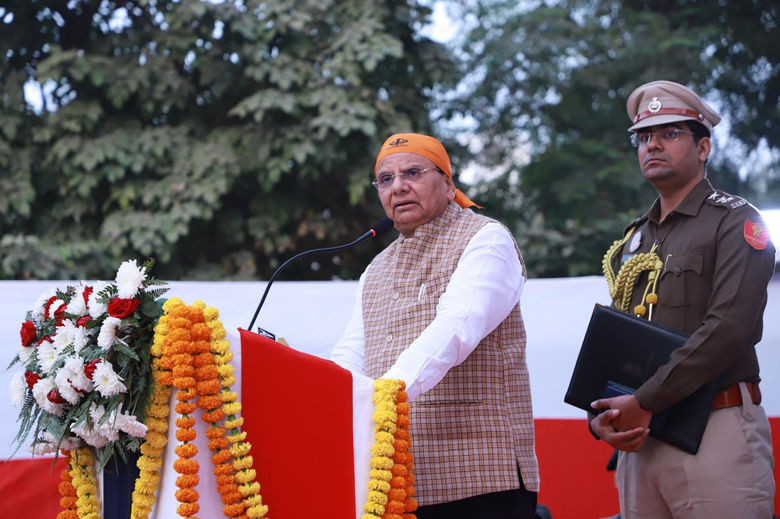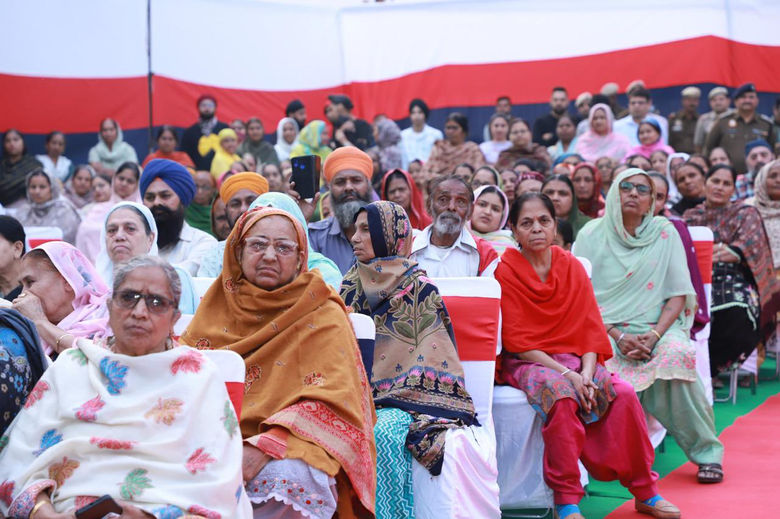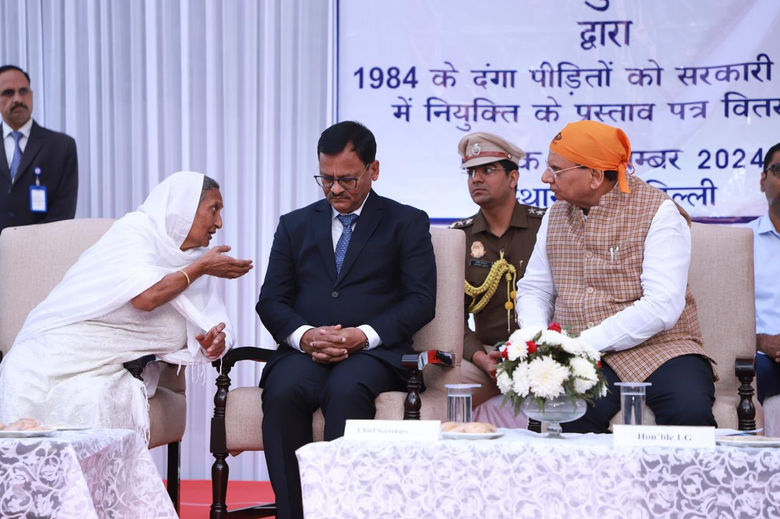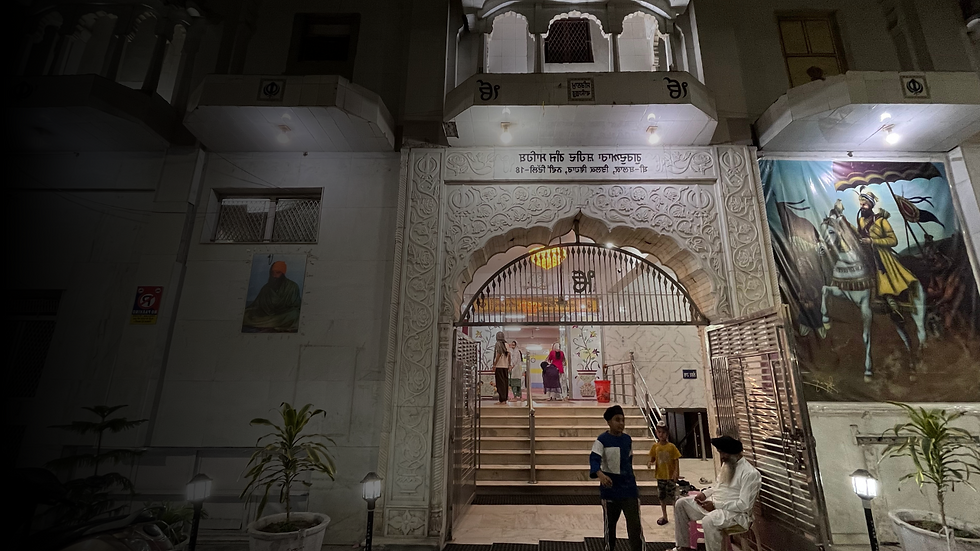
Stalled
Promises
Government's
Betrayal.
Six months after Delhi’s Lieutenant Governor V.K. Saxena handed over appointment letters to about 47 families of 1984 anti-Sikh carnage victims, the recipients are yet to be given joining dates. The appointment letters, distributed with much media attention on November 21, 2024, were seen as a long-overdue step towards justice and rehabilitation for the survivors. However, families say the delay in the next steps has left them anxious and confused.
For those living in Tilak Vihar, often referred to as the ‘Widow Colony’, the wait continues with no clarity from the concerned government departments. The colony got its name from the widows of the men who were killed during the carnage, who were relocated to this locality around 1985. The families say they have not been contacted since the letters were handed over and are unaware of which departments they are expected to join, or when.
Lieutenant Governor V.K. Saxena distributes appointment letters to 47 families in Tilak Vihar on November 21, 2024 (Courtesy: Office of LG)
Amar Singh, a resident of C-block, has said that he has gone through the medical tests as part of the process, but has not been contacted by any government official since then. He claimed, “It is getting difficult to feed my family over the days as I have no job. There is no certainty by when I will get the joining letter.” Singh runs a small shop in his residence where he sells accessories for mobile phones. The house that he lives in was allocated to his mother in 1985, after the violence.
The appointment letters had brought a sense of hope to many, especially among younger family members who have long struggled with unemployment and a lack of opportunities. For families who have lived through decades of trauma and neglect following the 1984 carnage, the promise of a secure government job was a rare moment of optimism.
But that optimism is now giving way to frustration. “We were happy when the letter was given to us. It felt like our struggles were finally being heard and recognised. But now, months have passed, and we don’t even know what we are supposed to do next,” said a young resident whose family received one of the letters.

Amar Singh, a 40-year-old resident of C-block, runs a small mobile accessories shop from his government allocated house.
It is getting difficult to feed my family over the days as
I have no job. There is no certainty by when I will get
the joining letter.
Amar Singh
Homes Falling Apart.
While the families wait for the promised employment, they continue to live in crumbling homes that were allotted to them after the violence. The flats in Tilak Vihar are visibly deteriorating—walls are cracked, and ceilings leak, making them a dangerous place to live in. Residents allege that there is no help from the government for the electricity. The Aam Aadmi Party (AAP) government installed electric meters soon after coming to power in 2015 and since then the residents of Tilak Vihar do not pay the bills. Residents demand that the government should subsidise the electricity for all.
“These houses were given to us after we lost everything. But nothing has been done since then to maintain them,” said a middle-aged resident who has lived in Tilak Vihar for over 30 years.
Major Singh, a resident of B-block, said that he is unable to maintain his house because he has no job. He received the appointment letter in November from the Delhi LG. He alleges that there is no communication from the government after the Assembly elections were over.
Singh’s mother was pregnant with him when the violence occurred in 1984. He lost his father and uncles in the carnage that killed more than 2000 people in Delhi, as per the Ministry of Home Affairs. Singh said that his mother struggled to bring him up since childhood, as she did not get any government job after the violence.

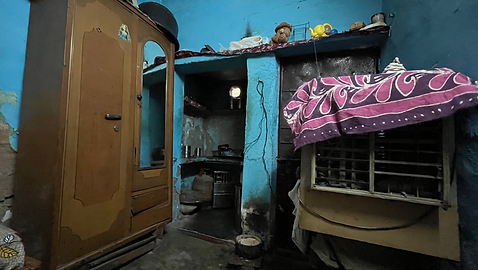
Dilapidated condition of a house in Tilak Vihar allocated in 1985.
Sanitation Woes and Garbage Crisis.
In addition to the poor housing, Tilak Vihar is grappling with severe sanitation issues. A large garbage dump has formed right behind a government school in the area, and locals say it has become a permanent fixture. The dump is often surrounded by stray dogs and cattle, and emits a strong stench that affects nearby homes and classrooms. The area lacks community parks for children. A park in block B has garbage dumped right around the corner.
Devender Singh, a 22-year-old resident, said, “Sewage drains were constructed just before the elections. After the results were declared, the drains have not been cleaned, and the roads have not been maintained.” He added, “We haven’t seen proper drain cleaning in months. Whenever it rains, water from the drains flows back into our homes.” Municipal cleaning in the colony is erratic. Residents say sweepers visit infrequently and only clean major roads, leaving smaller lanes and interior areas unattended. During the rainy season, the situation worsens, as clogged drains lead to waterlogging, mosquito breeding, and overflowing sewage.
There have been repeated complaints to the Municipal Corporation of Delhi (MCD), but residents say responses are slow, and often the problems are marked as resolved without any actual work being done.
Garbage all around the locality has now become a major sanitation issue. No action taken by authorities to clean drains and parks, claims residents.
A Legacy of Neglect.
Tilak Vihar was developed as a rehabilitation settlement for widows and families who lost loved ones in the 1984 anti-Sikh carnage. Many of the women living there today were in their 20s or 30s when they were resettled. Now in their 60s or older, they continue to wait for the promises made to them to be fully realised.
Most of the younger generation in the colony has grown up with limited access to quality education or job opportunities. For them, the appointment letters distributed in November represented more than just employment—they were seen as an official acknowledgement of their family’s suffering.
But the delays are quickly eroding trust. “We just want some clarity. Even if the process takes time, someone should at least inform us. We cannot live with this uncertainty,” said a resident who chose to remain anonymous.
Despite the hardships, the community continues to display resilience. The neighbourhood Gurdwara Shaheed Ganj Sahib helps each other with repairs, looks after elders who live alone, and supports school-going children. NGOs occasionally run health camps and distribute essentials, but sustained government support, they say, is what’s urgently needed.
The Road Ahead.
Residents are now urging the Delhi government and the LG’s office to expedite the joining process for those who have received appointment letters. They are also demanding a regular sanitation schedule, better waste management near schools, and repair of sewage lines. The local leader (referred to as Pradhan), Amar Singh, refused to comment on the issues when approached for a comment.
As the summer intensifies and the monsoon approaches, Tilak Vihar faces a growing risk of disease, structural damage, and further disillusionment. For a community that has already suffered profound loss, the wait for justice and dignity continues.
“We don’t need sympathy,” said one resident, “We need action on the front of jobs, sanitation, the homes we live in.”
Despite multiple attempts, the Lieutenant Governor’s office did not respond to queries on the matter.

